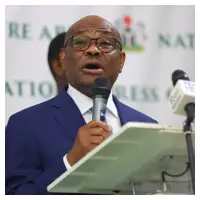As President Bola Ahmed Tinubu's administration approaches its second anniversary on May 29th, 2025, prominent economists have offered mixed reviews of the government's economic performance, acknowledging progress in stabilizing the economy while highlighting significant challenges in the cost of living for most Nigerians.
In separate interviews with DAILY POST, Muda Yusuf, Chief Executive Officer of the Centre for the Promotion of Private Enterprise, and Gbolade Idakolo, CEO of SD & D Capital Management, assessed the impact of Tinubu's 'Renewed Hope' agenda on Nigeria's economic landscape.
Tinubu's administration began with bold economic reforms, including the removal of fuel subsidies and floating of the naira on his inauguration day. These policies triggered immediate economic consequences, with fuel prices jumping from N198 to between N875 and N920 per litre currently, while the naira depreciated from N460.702 to N1,579.40 per dollar over the two-year period.
The ripple effects have been substantial, with inflation climbing to 23.71 percent in April 2025 from 22.22 percent in the same period in 2023, according to the National Bureau of Statistics. This has severely eroded purchasing power for many Nigerians, despite the government's approval of a N70,000 minimum wage in July 2024.
Muda Yusuf emphasized that the administration has primarily focused on fixing economic fundamentals and stabilizing the economy during its first two years. "It is perhaps fair to say that the first two years have been targeted at fixing the economic fundamentals and stabilising the economy," he stated.
Yusuf noted that the administration inherited significant macroeconomic challenges, including "a dysfunctional FX regime and scandalous management of fuel subsidy and the downstream sector." He acknowledged that while the reforms were necessary, they "inflicted significant pain on the citizens, adversely impacted businesses, and affected profit margins."
Despite these challenges, Yusuf highlighted several positive developments, including stability in the foreign exchange market over the past ten months, improved fiscal sustainability, progress with refineries, and an increase in net external reserves to $23 billion according to the Central Bank of Nigeria.
"Going forward, the government has the responsibility to ensure much more impactful measures to address the phenomenon of the cost of living for the ordinary people," Yusuf advised, calling for a recalibration of fiscal, monetary, and trade policies.
Gbolade Idakolo offered a similar assessment, noting that "the administration of President Tinubu started on a very challenging note" but has since implemented policies that have helped stabilize the economy. He pointed to strengthening of the naira, increased foreign reserves, and growth in GDP per capita income "by over 100%, from $200 billion to over $450 billion."
Idakolo also highlighted infrastructure developments, including the Lagos-Calabar coastal road project, establishment of six regional development commissions, and policies supporting domestic manufacturing and refineries.
However, both economists acknowledged the severe impact on Nigerians' standard of living. "The living standard of Nigerians in the past two years has seriously declined due to the policies of this administration," Idakolo admitted, while arguing that "continuing with the approach of the previous administration would have led to total chaos."
As the administration enters its third year, the economists suggest that having established some macroeconomic stability, the focus must now shift to alleviating the cost of living crisis and ensuring economic benefits reach ordinary Nigerians.













